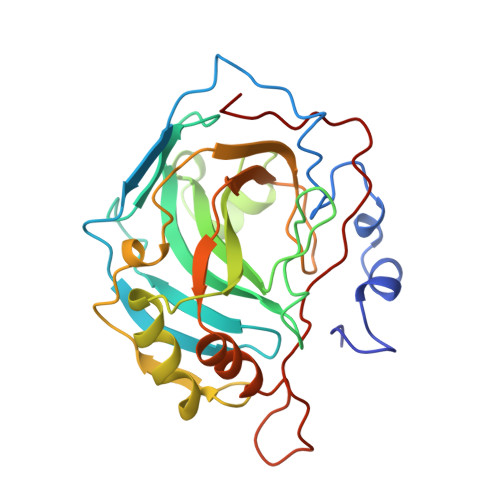Histidine --> carboxamide ligand substitutions in the zinc binding site of carbonic anhydrase II alter metal coordination geometry but retain catalytic activity.
Lesburg, C.A., Huang, C., Christianson, D.W., Fierke, C.A.(1997) Biochemistry 36: 15780-15791
- PubMed: 9398308
- DOI: https://doi.org/10.1021/bi971296x
- Primary Citation of Related Structures:
1H4N, 1H9N, 1H9Q, 2H4N - PubMed Abstract:
The catalytic zinc ion of human carbonic anhydrase II (CAII) is coordinated by three histidine ligands (H94, H96, and H119) and a hydroxide ion with tetrahedral geometry. Structural and functional analysis of variants in which the zinc ligands H94 and H119 are substituted with asparagine and glutamine, and comparison with results obtained with aspartate and glutamate substitutions indicate that the neutral ligand field provided by the protein optimizes the electrostatic environment for the catalytic function of the metal ion, including stabilization of bound anions. This is demonstrated by catalytic activity measurements for ester hydrolysis and CO2 hydration, as well as sulfonamide inhibitor affinity assays. High-resolution X-ray crystal structure determinations of H94N, H119N, and H119Q CAIIs reveal that the engineered carboxamide side chains coordinate to zinc with optimal stereochemistry. However, zinc coordination geometry remains tetrahedral only in H119Q CAII. Metal geometry changes to trigonal bipyramidal in H119N CAII due to the addition of a second water molecule to the zinc coordination polyhedron and also in H94N CAII due to the displacement of zinc-bound hydroxide by the bidentate coordination of a Tris molecule. Possibly, the bulky histidine imidazole ligands of the native enzyme play a role in disfavoring trigonal bipyramidal coordination geometry for zinc. Protein-metal affinity is significantly compromised by all histidine --> carboxamide ligand substitutions. Diminished affinity may result from significant movements (up to 1 A) of the metal ion from its position in the wild-type enzyme, as well as the associated, minor conformational changes of metal ligands and their neighboring residues.
Organizational Affiliation:
Department of Chemistry, University of Pennsylvania, Philadelphia, Pennsylvania 19104-6323, USA.















